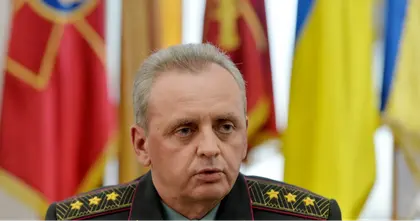A controversial Ukrainian general, who is no longer part of the national military leadership, on Tuesday warned the war against Russia will probably last at least another year unless Kyiv’s forces manage to defeat the Kremlin’s decisively in open battle - an outcome he said is far from guaranteed.
General Viktor Muzhenko, the former Commander-in-Chief of the Armed Forces of Ukraine (2014-2019), made the comments to the Fakty newspaper, a wide-circulation tabloid sometimes publishing high profile commentary critical of the government of Volodymyr Zelensky.
JOIN US ON TELEGRAM
Follow our coverage of the war on the @Kyivpost_official.
Muzhenko himself has been criticized by modern Ukrainian military reformers for his allegedly incompetent and negligent leadership during his tenure as the Chief of the General Staff. Among other accusations, they blame him for a devastating encirclement defeat suffered by poorly armed Ukrainian troops against conventional Russian army forces in the February 2015 Battle of Debaltsev.
Between 600 and Ukrainian soldiers were killed, wounded or taken prisoner after attempting to evacuate a perimeter Muzhenko ordered held around the Donbas town.
Muzhenko told Fakty that even if Ukraine’s upcoming offensive delivers excellent results, he expects that one year from now fighting will still be in progress because no operational Ukrainian advance or battleground victory is likely to force the Kremlin to opt for peace.

Trump Makes 90 Day Foreign Aid Freeze – Ukraine Military Support Supposedly Untouched
The only chance of an earlier end to combat would be a negotiated agreement potentially in the Fall, or a change in Ukraine’s political leadership, he said.
Muzhenko said that from the Kremlin perspective, the long-term strategy of wearing down Ukraine is succeeding, with small but continually incremental gains in the Donbas sector, and no substantial Ukrainian advances since November.
According to Muzhenko, Russia has in no way abandoned its overall objectives of capturing and annexing Ukraine’s Kharkiv, Poltava, Luhansk, Donetsk, Zaporizhia, and Kherson regions. He said that, unless halted on the battlefield, the Kremlin will continue to commit men and resources toward those goals.
"But I really hope that this scenario will never come true," the general added.
In a wide-ranging Fakty interview on Mar. 24, Muzhenko cautioned Ukrainians not to be overly optimistic about the outcome of the Armed Forces of Ukraine’s (AFU) upcoming Spring offensive, but rather to keep expectations realistic and to acknowledge the size and power of the Russian army they are up against.
Russia is, possibly, already building a reserve of trained soldiers of as many as 200,000 men, and Russian factories potentially are through refurbishment or new builds delivering about 100 tanks to the Russian army monthly – worst case figures neither Ukrainian military planners nor the general public can afford to ignore, Muzhenko said.
In that interview Muzhenko said Ukraine nonetheless has “all the possibilities and chances” to defeat Russia on the battlefield, but the fighting could well be bloody. If the Ukrainian people expect the upcoming offensive will be easy and quickly successful, and it turns out to be a deadly slog with massive casualties, the shock to Ukrainian public confidence could trigger a political upheaval in the Ukrainian government, and a drastic curtailment of western support to Ukraine’s military, he predicted.
Muzhenko said dramatic Ukrainian success is nonetheless possible due to the likelihood most Russian soldiers will not be morally committed to fighting, and that actual Russian arms production capacity is probably well below Kremlin claims.
But even a string of Ukrainian battlefield victories in the next few months are unlikely to halt Russian efforts to defeat Ukraine, and by Autumn the Kremlin might well have amassed sufficient men and machines for another major offensive, he said.
Muzhenko suggested an August launch of renewed major Russian attacks was likely because July-August 2023 would mark the 80th anniversary of the Soviet Union’s defeat of invading German forces at the Battle of Kursk, an event fetishized by Russian state media as the most decisive battle of the entire Second World War. The goal of the Kremlin offensive could be as just as much to remind the Russian public of “Great Patriotic War”-linked state narratives, as to gain ground in Ukraine, he said.
“The thing is, it’s necessary to evaluate the Russians’ capacity to increase its existing park of weapons and military equipment, and to create new military units and formations,” Muzheko said. “They will be capable of attacking and they will still have their objectives.”
You can also highlight the text and press Ctrl + Enter










